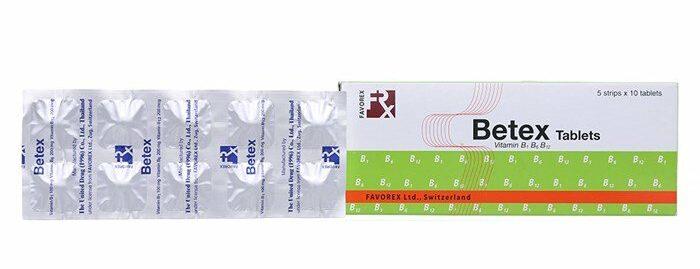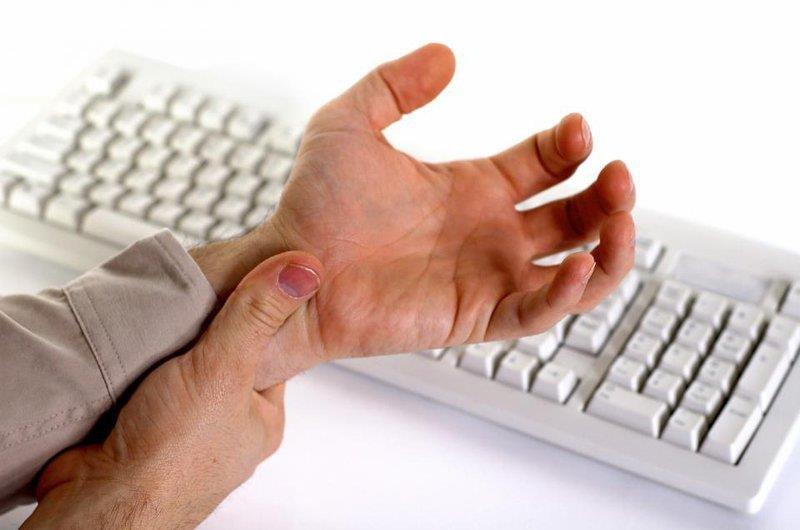Betex drugs: uses, usage and notes

Betex medicine is a combination of B vitamins, including vitamins B1, B6 and B12, commonly known as essential neurotropic vitamins. So how is the drug used and what are the notes to know? Let's learn the necessary information about Betex drugs through the following SignsSymptomsList article.
Active ingredients: Vitamin B1 (Thiamin): 100mg, Vitamin B6 (Pyridoxine): 200mg, Vitamin B12 (Cyanocobalamin): 200mcg.
Drugs with similar ingredients: Scanneuron, Fostervita, Trineulion, Gelabee, ...
content
- 1. What is Betex?
- 2. Indications of the drug Betex
- 3. Dosage and way of taking the drug
- 4. Contraindications of the drug Betex
- 5. Notes when using drugs
- 6. Undesirable effects
- 7. Interaction with the drug Betex
- 8. Overdose with Betex
- 9. Pregnant and lactating women
- 10. How to store Betex
1. What is Betex?
Betex tablets are film-coated tablets containing B vitamins including vitamins B1, B6 and B12. These vitamins are often referred to as essential neurotropic vitamins. They are coenzymes in central and peripheral nervous system metabolism.
Vitamin B1 (thiamin) is needed for cell growth, development and function, and helps the body make energy. Foods rich in thiamin include brewer's yeast, legumes, pork, brown rice, cereals, etc. However, heating food can reduce thiamin content. Vitamin B1 deficiency can lead to nerve-damaging conditions such as Wernicke-Korsakoff syndrome or beriberi. The recommended daily intake of thiamin for adult males is 1.2 mg and 1.1 mg for adult females.
Vitamin B6 (pyridoxine) occurs naturally in foods such as meat, poultry, nuts, whole grains, bananas, avocados. Vitamin B6 is important for many processes in the body. Vitamin B6 deficiency can cause seizures in infants and cause anemia. The recommended intake of vitamin B6 for people over 18 years of age is 1.3 mg/day in men and 1.2 mg/day in women; for people from 19 to 50 years old is 1.3 mg / day, for men from 51 to 70 years old is 1.7 mg / day.
Vitamin B12 (cyanocobalamin) is important for growth, cell reproduction, blood formation, protein and tissue synthesis. Vitamin B12 deficiency leads to megaloblastic anemia, damage to the digestive and nervous systems. In adults, the daily requirement of vitamin B12 is about 1-2 mcg and this amount is mostly found in the normal diet.

2. Indications of the drug Betex
The drug Betex is used in the following cases:
- Vitamin B1, B6, B12 deficiency in beriberi diseases, iron deficiency anemia, peripheral neuritis, pyridoxine deficiency convulsions in children and other disorders related to vitamins B1, B6, B12.
- Supportive treatment of nervous system disorders such as: neuritis caused by alcohol, diabetes, drugs; peripheral neuritis: polyneuritis, neuralgia, sciatica, shoulder-arm syndrome, low back pain, intercostal neuralgia, trigeminal neuralgia, headache spend…
- As a tonic during convalescence, when tired or for the elderly, supporting treatment in joint pain.
3. Dosage and way of taking the drug
Betex should be taken after meals. You should take the medicine as directed by your doctor. Unless otherwise directed, the usual dose is 1 tablet three times a day.

4. Contraindications of the drug Betex
Betex should not be used in the following cases:
- Hypersensitivity to vitamin B1, vitamin B6, cobalamin (vitamin B12 and related substances) or to any of the excipients.
- Concomitant use with levodopa.
- Have Leber's disease (an inherited form of vision loss). Cyanocobalamin can cause optic nerve damage (and possibly blindness) in people with Leber disease.
If you experience any side effects while taking the medicine, notify your doctor or pharmacist immediately. In severe cases, you need to go to the nearest medical center for support.
5. Notes when using drugs
To make sure Betex is safe for you, read the instructions for use carefully before taking it. If you need more information, consult your doctor.
Although Betex contains cyanocobalamin, it is not the appropriate form of vitamin B12 to treat optic neuropathy associated with elevated blood cyanocobalamin levels.
6. Undesirable effects
Common side effects of Betex may include:
- signs of an allergic reaction such as itching, hives, difficulty breathing; swelling of the face, lips, tongue, or throat;
- Weakness and fatigue, sweating,
- Nausea, diarrhea;
- headache, drowsiness, restlessness;
- Mild numbness or tingling, swelling.
The above may not be enough for the side effects of the drug. If any undesirable effects appear, immediately notify your doctor or pharmacist. In severe cases, you need to go to the nearest medical center for support.

7. Interaction with the drug Betex
- There is an interaction with levodopa, specifically the pyridoxine in Betex reduces the effect of levodopa
- There is currently no evidence that thiamin interacts with other medications. However, regularly chewing areca (betel) or eating raw fish or shellfish can cause thiamin deficiency.
- Avoid drinking a lot of alcohol while taking vitamin B12. Vitamin B12 can also affect the results of some medical tests.
Inform your doctor about the drugs (including prescription and over-the-counter drugs, vitamins, herbal medicines, etc.) and foods that you are taking. If you notice any unusual signs while taking the drug, immediately notify your pharmacist or doctor.
8. Overdose with Betex
With overdose, overdose symptoms are very rare. However, high doses of pyridoxine (2-7 g/day) have been associated with ataxia-related sensory neuropathy.
Treatment: you should stop taking the drug and inform your doctor immediately. In case of any serious reactions suspected of overdose, it is necessary to go to the nearest medical center for assistance.
9. Pregnant and lactating women
- Pregnancy: Betex is very unlikely to cause harm to the fetus. However, like other drugs, it should only be used during this period when absolutely necessary.
- Lactation: Use caution when administering this drug to a nursing woman.
Before using any medicine during this period, you also need to consult with your doctor, pharmacist to make sure it is safe.

10. How to store Betex
- Store Rotex drugs at temperatures below 30oC; Store in a dry place, away from moisture and direct sunlight.
- Keep medicine in a safe place, out of reach of children and pets.
- Do not use the medicine after the expiry date (EXP) printed on the box.
Thus, Betex drug is used to support the treatment of nervous system disorders or other disorders related to vitamin B1, B6, B12 deficiency. The drug can also be used as a tonic during convalescence, when tired or for the elderly. However, to be able to ensure safety and effectiveness, you should consult a doctor before use. The information above is for reference only and is not a substitute for medical treatment.
Pharmacist Tran Van Thy